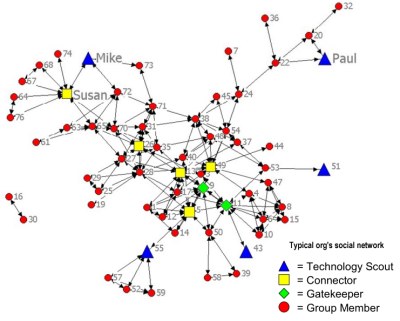It’s not what you know, but who you know. It is something of a cliché, but in a world where the social context of knowledge is becoming increasingly important. Think Reddit, Twitter, Facebook, Mendeley etc. The data, the information, seems only relevant if we have some kind of peer review, the “+1”, “like”, or “thumbs-up” from our friends and acquaintances. Nowhere is the social content more pertinent than in organisations where knowledge and talent are the currencies of every transaction from the research group to the stock market.
Writing in the EJIM (full reference below), information management expert Eoin Whelan of the University of Limerick, Ireland, explains how social network analysis can support talent management initiatives in knowledge-intensive work environments. His analysis of the working networks and interview data from the R&D divisions of two multinationals shows how “getting” social can help management make the most of their talent pool by ensuring that the right people aer at the right place at the right time for a given task and also developing a strategy for responding to a brain drain or talent raid when star performers suddenly leave the organisation en masse.

Essentially, talent management, a concept that has existed in various forms since at least the mid-twentieth century, needs to go beyond identifying the key positions within an organisation and the skills and characters of individuals. Instead, it must now identify the connections between the different people occupying key but complementary key positions. “Social network theory posits that it is the ties and relationships between individuals – and not individual attributes – that really matter,” Whelan explains.
Indeed, while such a notion might not feel too comfortable from an egocentric point of view, there is plenty of potential for any individual node within a network to grow its connections and to become an important hub with personal benefits, while benefiting the network as a whole.
![]() Eoin Whelan (2011). It’s who you know not what you know: a social network analysis approach to talent management European J. International Management, 5 (5), 484-500
Eoin Whelan (2011). It’s who you know not what you know: a social network analysis approach to talent management European J. International Management, 5 (5), 484-500